Operation "Exporter". How the British took over Syria
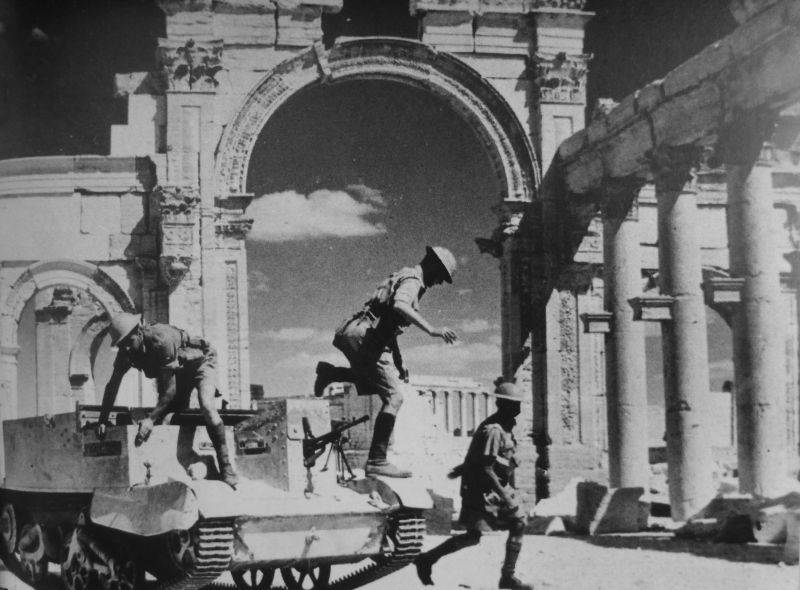
British soldiers disembark from the Bren Carrier armored personnel carrier at the ancient Arc de Triomphe in Palmyra
Eighty years ago, British troops conducted Operation Exporter and invaded Syria and Lebanon under French control. The four-week military operations of the British Expeditionary Force, which included the British, Australians, Indians and Free French fighters, began against the French troops.
Fierce battles unfolded, during which the French troops under the command of General Henri Denz often went over to counterattacks and adequately defended the honor of France. The air supremacy of the British ultimately decided the outcome of the campaign. Damascus fell on June 21, Palmyra on July 3, and the Allies reached Beirut on July 9. On July 11, 1941, hostilities were suspended. On July 14, an armistice agreement was signed in Acre, under which the British took control of Syria and Lebanon. Thus, England seized a strategic foothold in the Eastern Mediterranean, from which the Germans could threaten Egypt and the Suez Canal.
World War II and Syria
After the defeat and collapse of the Ottoman Empire, its Middle Eastern possessions were divided between Britain and France. Syria, which included today's Lebanon, came under French control. In 1930, the Syrian Republic was created, but it continued to be under French control. After the surrender of France in 1940, the question arose about the future of the mandated territories. First, the new commander of the troops in Syria and Lebanon, General E. Mittelhauser, said that the Levant army would continue to fight on the side of the Allies. However, on June 25, 1940, the French Minister of War, General Weygand, issued an order to all troops in the colonies and mandated territories to comply with the provisions of the armistice with Germany. Mittelhauser obeyed this order.
In Syria itself, the attitude to the world war was not unambiguous. Part of the politically active public advocated support for the Vichy regime and an alliance with Germany, hoping that the victory of the Axis countries would give Syria independence. Another part of the politicians did not object to the British occupation, also hoping to gain independence, already from the hands of England. In addition, there were fears that the war would cause new economic hardship, disease and famine, as it did during the First World War. The British extended the economic blockade to Syria and Lebanon. In particular, they stopped the supply of oil from Iraq, which caused an acute shortage of fuel.
Commissioner of the French Levant and new commander of the troops Henri Fernand Denz entered into negotiations with the Syrian nationalists and said that the Vichy government supports Syria and Lebanon in their quest for independence, but the discussion of this issue requires appropriate conditions. In April 1941, Denz again promised independence to Syria and Lebanon, but stressed the impossibility of implementing this step in a war.
It is worth noting that the uprising in Iraq found wide support among the Syrian nationalists. Demonstrations were held in a number of large cities in support of the anti-British uprising. Many nationalists went to Baghdad to fight the British. In the wake of the success of the Third Reich in Syria, the number of supporters of the alliance with Hitler is growing.
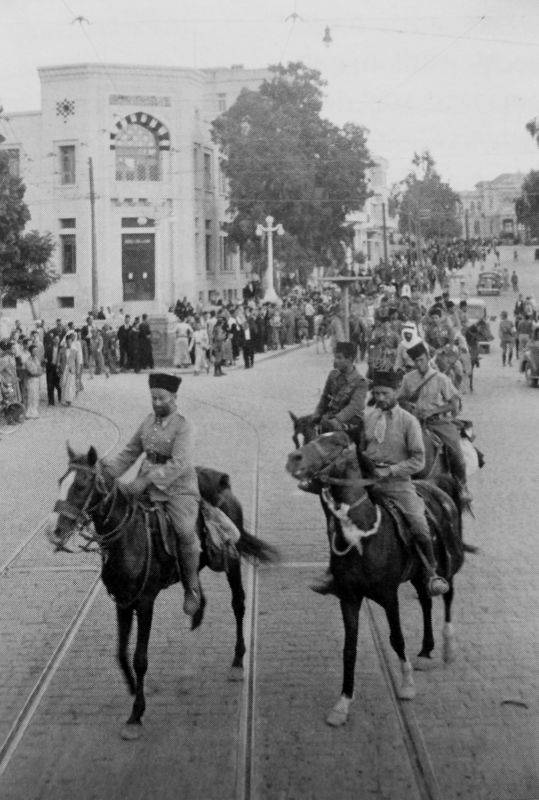
Cavalry of the Circassian squadron on the streets of captured Damascus. Circassian units of the Syrian colonial army went over to the side of the allies and, as part of the Free French troops, participated in battles against parts of the Vichy regime in Syria
The situation before the operation
Immediately after the suppression of the occupation of Iraq (Iraqi Blitzkrieg of the British Army) the British command began to prepare an operation against Iran and Vichy forces in Syria and Lebanon. A series of defeats in 1940-1941, the capture of Greece worsened Britain's position in the Mediterranean. The British wanted to eliminate a possible German foothold in the Middle East. Germany and Italy could use the territory of Syria and Lebanon against Palestine and Egypt, or launch an offensive in Iraq. England sought to strengthen its position in the Middle East and the Eastern Mediterranean, for this it was necessary to capture Syria and Lebanon. The interests of the French allies were also taken into account. The head of the Free French government, General de Gaulle, tried to tear away as many colonies as possible from Vichy France and use them as a base for creating his own armed forces.
During the war in Iraq, where an uprising against British rule in the region took place, the Vichy regime allowed the Germans to use military supplies in Syria to support Baghdad. Also, the French allowed the transit of military cargo through their territory and provided Germany with several airfields in northern Syria. In response, Churchill allowed the British aviation bomb the Axis air force bases in Syria. Also, the British offered the Free French to launch an operation against the Vichy regime in Syria as soon as possible. After the British occupation of Iraq, at the request of the French, a German limited contingent left Syria. However, London decided to use this situation as a pretext for an invasion.
In June 1941, London came out with a sharp protest against the actions of the Vichy regime in the Levant, stating that its policy of cooperation with the Axis countries went beyond the terms of the Franco-German armistice. Therefore, the British military forces, with the support of the Free French troops, intend to defend Syria and Lebanon. De Gaulle and the British promised to grant freedom and independence to the countries of the Levant.
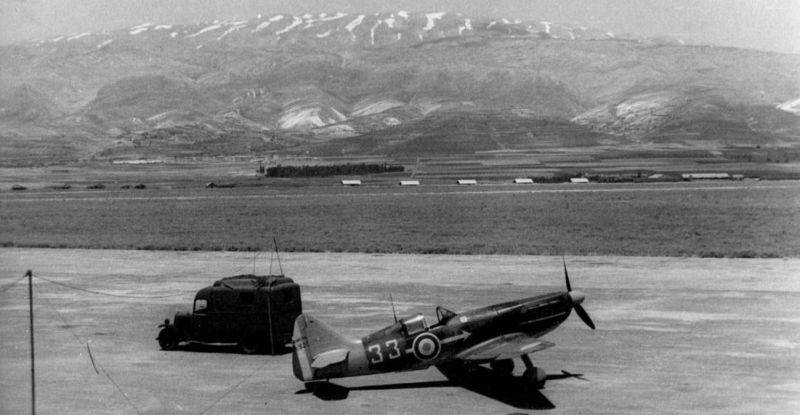
Fighter Dewoitine D.520 of the air force of Vichy France at the Lebanese airfield
The forces of the parties
On the part of the allies, units of the 7th Australian Division, the 1st British Cavalry Division (based in Palestine, Jordan, later reorganized into the 10th Armored Division), the Indian Infantry Brigade, six battalions of the 1st French Free Division and other units. The allied forces numbered over 30 thousand people. The ground forces were supported by over 100 aircraft and a naval squadron. The command of the combined allied forces was carried out by the commander of the British forces in Palestine and Transjordan, General Henry Wilson. The Free French troops were led by General J. Catroux. The offensive was carried out by three shock groups: from Palestine and Transjordan to Beirut and Damascus, from Western Iraq to Palmyra and Homs, from Northern Iraq along the Euphrates River.
The grouping of Vichy troops numbered over 30 thousand people (according to other sources, up to 45 thousand). It had 90 lungs tanks and 120 guns. The Air Force numbered about 100 vehicles.
Battle
Since mid-May 1941, the British Air Force has been striking Syria and fought fierce battles with enemy aircraft. On the night of June 8, 1941, the southern group crossed the border and began an offensive to the north. Contrary to the expectations of the allies, who believed that the Vichy regime was weak and its troops would quickly surrender or go over to their side, the French put up stubborn resistance. Most of the French at this time disliked the British for their behavior during the French campaign and for the capture and destruction of the French. fleet... And de Gaulle's supporters were considered traitors. Therefore, the Vichy fought bravely.
So, on June 9, the allies captured the city of Quneitra in southwestern Syria. But the Vichy, bringing up their armored vehicles, launched a counterattack and on June 15 recaptured the city. At the same time, an enemy battalion was captured. From 9 to 22 June, fierce battles were fought for the Lebanese city of Merjuon, which passed from hand to hand. The British could not take Damascus on the move. The Indian units that reached Damascus were counterattacked and blocked for two days. Only on June 21, when the main forces of the allies reached the city, the French surrendered Damascus.
A mechanized group (Arab Legion, units of the 1st Cavalry Division) advancing from the desert region of Western Iraq successfully operated in central Syria. The British successfully captured the mountain passages and occupied Palmyra on July 3. True, even here the Vichy did not surrender without a fight. On July 6, groups of allies united, which were advancing from Palestine and Western Iraq. On July 1, the northern group began an offensive, which quickly advanced towards the Mediterranean Sea. In this sector, the Vichy resistance was weak.
By July 9, 1941, having broken through the French defenses at Damur, the Allies reached Beirut. This decided the outcome of the campaign. General Denz began surrender negotiations. On July 11, hostilities were stopped, on July 14, an armistice was signed. At this time, the commander of the Vichy forces managed to send all the remaining aircraft and ships to France. Under the terms of surrender, surrendered French soldiers could return to France or join the Free French forces. Almost everyone chose to return to their homeland.
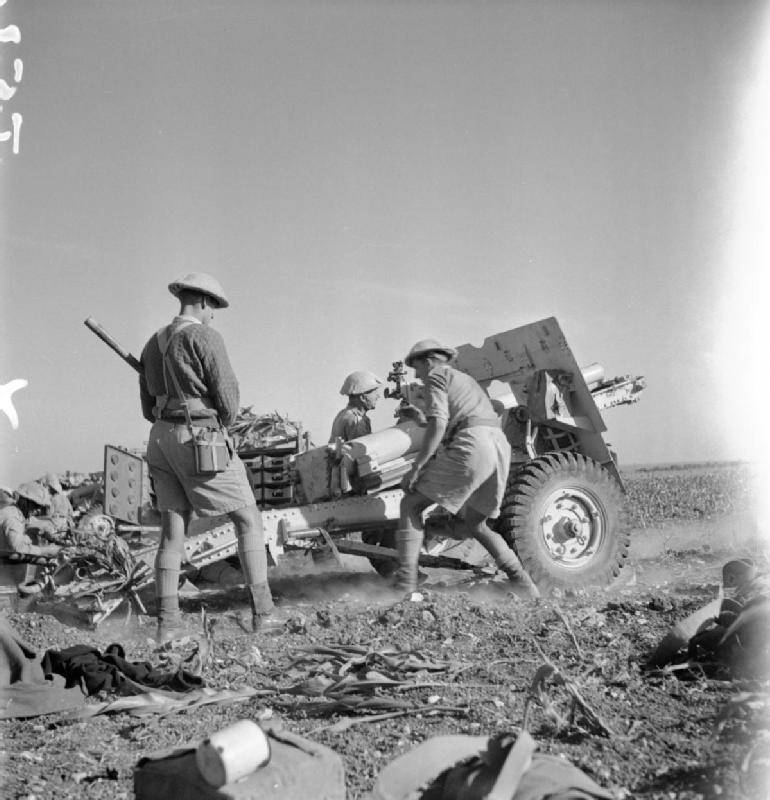
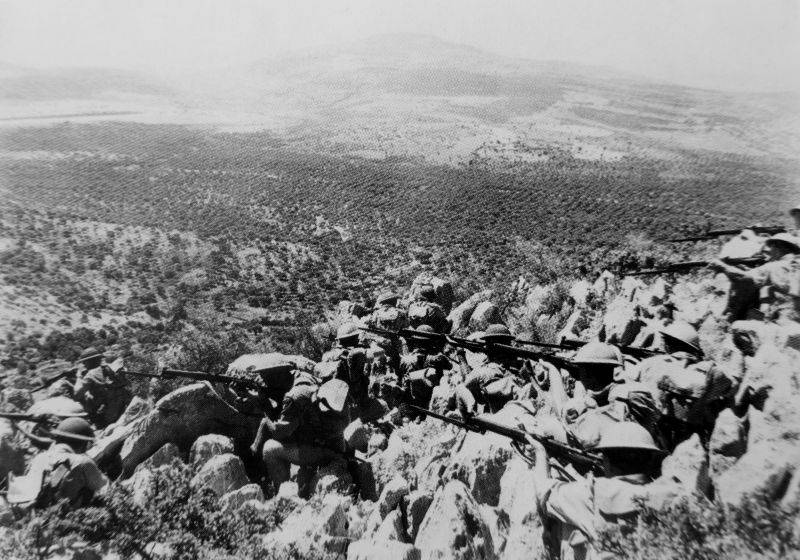
Australian soldiers in position during the offensive in Syria
Results
The campaign was short, but the fighting was tenacious. Hence, quite high losses. The Allies lost over 4 thousand people, about 30 aircraft. The losses of the French - according to various sources, from 3,5 to 9 thousand killed and wounded, about 5 thousand prisoners. So, for comparison: during the Norwegian campaign of 1940, Germany lost over 5 thousand people, the allies - more than 6 thousand.
As a result, England strengthened its position in the Middle East and the Eastern Mediterranean. Eliminated a possible threat to its positions in Palestine, Egypt and Iraq. De Gaulle's "Free France" received a base for the further struggle against the Nazis. When deciding the further fate of Syria and Lebanon, disagreements arose between Churchill and de Gaulle because of the desire of the British to establish their military control over these territories. Ultimately, de Gaulle recognized the supremacy of the British in the military field, but the French retained political and administrative control over Syria and Lebanon.
On September 27, 1941, General Katru officially announced the granting of independence to Syria. Sheikh al-Hasani became the president of the country. Lebanese independence was proclaimed in November. But the real power until the end of the war remained with the French authorities and the British military.
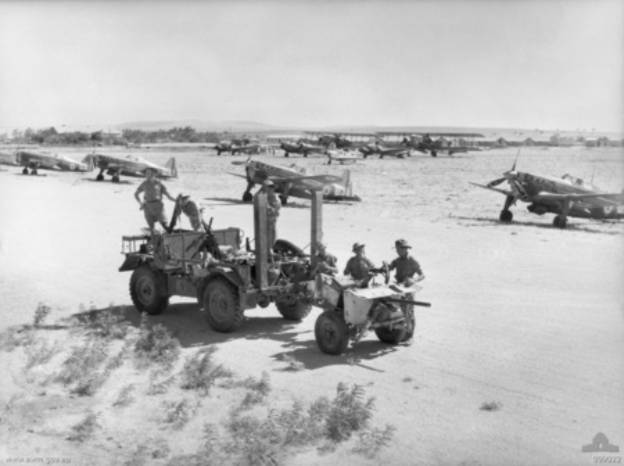
Australian troops at the French Aleppo airfield, Syria, June 1941
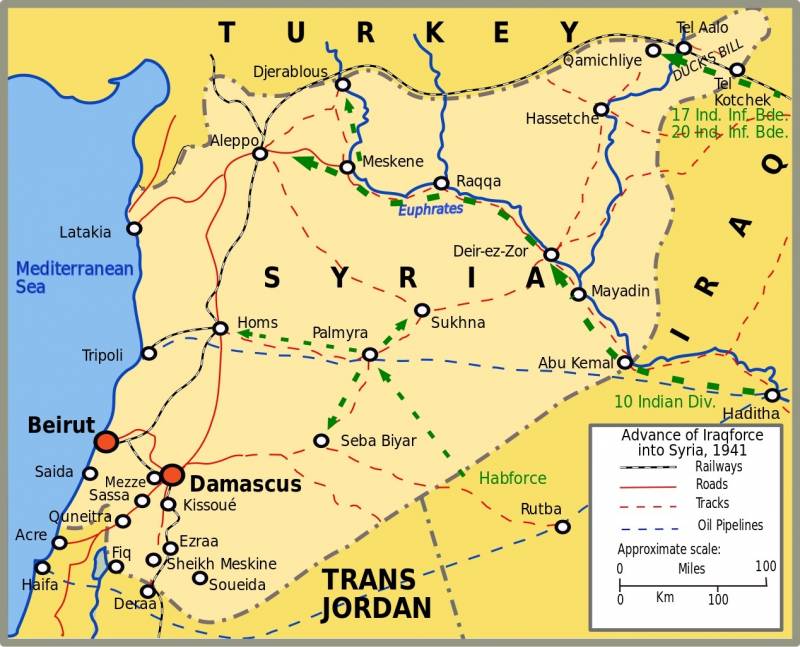
Information